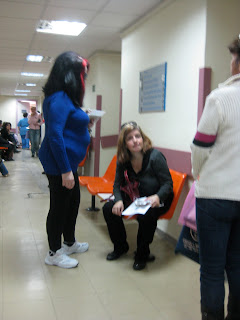 |
| A rather healthy Athenian Stray |
Actually, just a regular old sinus infection, but it wiped me out. I've spent a lot of time these past two weeks laying in bed. On Sunday mornings, I've listened to what sounds an awful lot like the call to prayer but is actually just Athenians driving around with loudspeakers asking people to give them their old TVs and junk. I've read a good chunk of the Odyssey, which I'm quite enjoying. It's fun to read about places I've been to or will go to soon, and about people who half of my students are named after.
By half, I mean the female students; there are plenty of Aphrodites, Artemises, and Calliopes in my classes. But almost all Greek boys have one of about five different names: Dimitris (Jim), Konstantinos, Giannis (John), Gorgos (George), and Nikolas (Nick).
Anyways, being sick put me into a pretty bad slump. Or should I say, aggravated the slump - A lot of the fellows have been feeling a little down lately, myself included. It's helpful and interesting to think about this in a broader context, because according to "The Phases of Culture Shock," the three month point is about exactly when shit is supposed to be shittiest:
"After some time (usually three months but it may be sooner or later depending on the individual), differences between the old and new culture become apparent and may create anxiety. That sense of excitement will eventually give way to new and unpleasant feelings of frustration and anger as you continue to have unfavorable encounters that strike you as strange, offensive, and unacceptable. These reactions [...] are typically centered on the formidable language barrier as well as stark differences in: public hygiene; traffic safety; the type and quality of the food..."
Word. Good to know.
For me, it's important to remember how much my physical state effects my mental state. For example:
Last wednesday we had another day off (not really sure why), and I went to the hospital (different one) to get some antibiotics. When asked if I had insurance, I tried to explain that I had some insurance through my job at Athens College. One of the secretaries then took my medical form and began making all these phone calls to the American College in Greece and put me on the phone with the director of that program, and while trying to explain to this stranger on the other end of the line and this secretary who didn't speak very good English that I had no connection with the American College in Greece I almost burst into tears. I was sick, tired, and utterly confused. The language barrier never gets any easier.
By the time I had regained physical strength, school was back in session. It felt great to be around other humans and not in bed by myself all day. And I'm really enjoying teaching, so it was nice to be back in the classroom with the kids. Although ideally my next step in life would be to become a singer on a cruise ship, it's good to know that I could be happy teaching as well.
In my eleventh grade class, we are reading "Macbeth." A little while ago I met a Greek actor who is acting in a Greek version of "Macbett" (Eugene Ionesco's "theatre absurd" interpretation of the original play). He told me to come check it out, so this weekend, looking for something different, Mandee and I went to see some Greek theatre.
I figured that since I'm reading "Macbeth" in class, I'd be able to understand what was going on in the play, even though it was in Greek. Not at all the case. Ionesco's script is pretty cracked out, and the six actor ensemble (who played the thirty something characters) went totally crazy with costumes and props and choreography, so I couldn't understand a bloody thing. However, this show was VERY entertaining. There were sequins and dance numbers and women in bikinis and people dying left and right and yelling and running around and women dressed as men and men wrapped in sheets dressed as Mother Theresa, and even though I had no idea what was going on, I loved it. So - if you ever want to see a piece of theatre in a language you don't understand, I highly recommend seeing something in "the Theatre of the absurd" genre. The visuals will keep you engaged.
My Greek is improving, though slowly. When I was sick I had some time to really sit down and study it, and just a few hours made a big difference. I need to get into the habit of just studying. The problem is that I almost never get a chance to actually practice saying anything, because everyone speaks English anyways. However, it is fun to learn a new language. It's like a puzzle, and I'm enjoying using my brain in a new way.

For "Study Time," I've discovered a lovely little cafe in Halandri: Le Petit Fleur. It's quite small and often hard to get a table, but well worth the wait. It serves the most incredible hot chocolate - it's so thick that it's more like chocolate soup than a chocolate drink. There are many flavors - my favourite so far is brandy, orange and cinnamon. The cafe is delightfully decorated (hot pink motif), serves delicious carrot cake and other pastries, and very pleasant to just sit in. They play old French records (Edith Piaf etc).
 |
| New Staple Food |
















